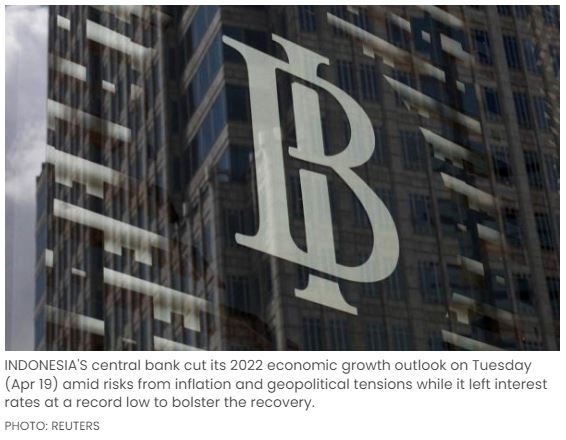Indonesia central bank trims GDP outlook, keeps rates on hold
INDONESIA’S central bank cut its 2022 economic growth outlook on Tuesday (Apr 19) amid risks from inflation and geopolitical tensions while it left interest rates at a record low to bolster the recovery.
Bank Indonesia (BI) kept the benchmark 7-day reverse repurchase rate at 3.50 per cent, as expected by all economists in a Reuters poll. It also left steady other policy rates for the overnight interbank money market.
BI has been adamant about maintaining low interest rates for as long as possible, even as other Asian central banks began to tighten monetary policy to temper a spike in commodity prices as the Ukraine-Russia war exacerbates supply chain disruptions.
Inflation in South-east Asia’s largest economy was still within BI’s 2 per cent to 4 per cent target range, although consumer prices rose to a two-year high in March at 2.64 per cent.
Jakarta has been keeping a lid on inflation by subsidising some fuel prices and intervening in cooking oil prices.
On the flip side, the commodity price upcycle has boosted Indonesia’s exports and trade surplus, which analysts said provided it with a cushion to confront global monetary tightening, including aggressive US rate hikes.
Previous monetary tightening moves by the United States had triggered capital outflows and swings in the rupiah currency.
Nonetheless, Indonesia’s central bank lowered its economic growth outlook for this year to 4.5 per cent-5.3 per cent, from 4.7 per cent-5.5 per cent previously.
“Slower growth and higher inflation mark an uneasy combination for many policymakers now, including for Bank Indonesia,” said Wellian Wiranto, an economist at OCBC Bank.
“Going forward, despite such budding growth concerns, we expect BI to start to prioritise inflation fight,” he added, predicting BI would start its rate hike cycle next month for a total of 100 basis points this year.
During the pandemic, BI cut interest rates by a total of 150 basis points and injected billions of dollars into the financial system. It began to unwind all of that with a reserve requirement ratio hike in March. REUTERS


 Thailand
Thailand




